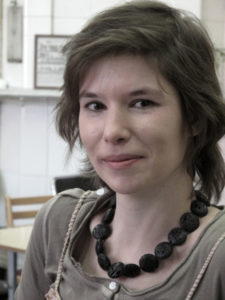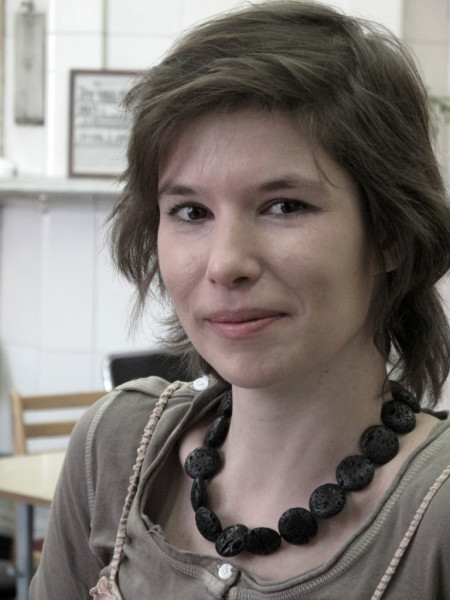Anna Klepikova

Academic Interests: disability studies, medical anthropology, psychological anthropology, social studies of mental health, anthropological study of alternative and augmentative communication
Education and Degrees:
2002 – 2007 – Department of English Philology and Translation, St.Petersburg State University.
2007 – 2009 – Master’s Program “Theory of Translation and Interlingual Communication”, St.Petersburg State University. Master of Linguistics.
2008 – 2011 – Department of Anthropology, European University at St.Petersburg. Master of Cultural Anthropology. The topic of Master’s Thesis: “The Lifeworld of a Child with Disabilities in a Special Residential Institution”.
2014 – defended the dissertation “Social Construction of Disabilities in the System of Special Residential Care Institutions”, Saratov State Technical University, receiving the “candidate of science” degree (PhD equivalent).
Work Experience:
2004 – 2007 – freelance translator, the Arctic and Antarctic Research Institute, St.Petersburg
2007-2008 – English language lecturer, St.Petersburg State University
2011 – 2018 – PR manager, Department of Anthropology, European University at St.Petersburg
2013 – 2015 – visiting teacher, Caritas Educational Center, St.Petersburg, conducting seminars for social workers in disability services
2014 – 2018 – research associate, Department of Anthropology, European University at St.Petersburg
2018 – present – research fellow, Department of Anthropology, European University at St.Petersburg
2019 – present – assistant professor, Department of Anthropology, European University at St.Petersburg
Courses Taught:
Introduction to Medical Anthropology, with Dr. Maria Pirogovskaya, EUSP
Introduction to Social Study of Medicine and Health, with Dr. Maria Pirogovskaya, Dr. Ekaterina Borozdina, EUPS
Psychological and Cognitive Anthropology, with Dr. Ilya Utekhin, EUSP
Qualitative Methods, with Dr. Anastasiya Novkunskaya, EUSP
Research Seminar, with Anna Altukhova, Anastasiya Novkunskaya, EUSP
Grants and projects:
2016 – 2017 – RHSF grant 16-01-00145, researcher in the project “Representations of People with Disabilities”
2016 – 2017 – Head of the research project “Children and Adults with Intellectual Disability: Study of a Social Construction of Disability in Family Settings and Community Care Rehabilitation Centers” (supported by “Stupeni” and “Vykhod” foundations)
2020 – 2021 – RFBR grant 20-09-00063А, researcher in the research project “Disability as a Socio-Cultural Phenomenon”
Internships and Exchange Programs:
October – December 2017 – Russian and East European Institute, University of Indiana, Bloomington, USA, visiting scholar
February 2020 – Cancer Care, Prevention, and Public Health Education, International Visitor Leadership Program, Department of State, USA
Other Professional Activities:
2012 – present – annual conference “Anthropology. Folklore Studies. Sociolinguistics”, European University at St.Petersburg, member of organizing committee
2017 – conference “Social Studies of Medicine: Medical Knowledge, Practices and Institutions in Soviet and Post-Soviet Context”, April 2017, European University at St.Petersburg, member of organizing committee
2018 – present – co-organizer of a regular seminar on medical anthropology, European University at St.Petersburg
2018 – present – co-organizer of an educational program “Social Study of Health and Medicine”, European University at St.Petersburg
Fieldwork:
2009 – 2010 – participant observation in a residential care institution for children with mental retardation, St.Petersburg
2010 – 2011 – participant observation in a residential care institution for adults with mental health problems, St.Petersburg
2012 – 2013 – participant observation and series of interviews in a family with seven adopted children with multiple disabilities, Astrakhan; series of interviews with NGO volunteers working with people with multiple disabilities inside the state-run institutions, NGO experts and lawyers specializing in the field of disability rights, St.Petersburg
2014 – participant observation as a volunteer in a human rights project for people with mental health problems launched by an NGO inside state residential care institutions, St.Petersburg
2015 – participant observation in school classes for children with multiple disabilities living in a residential care institution, interviews with special education experts, St.Petersburg; series of interviews with families adopting children with disabilities, St.Petersburg
2016 – 2017 – participant observation in families with children with mental and multiple disabilities, interviews with family members, St.Petersburg; participant observation in rehabilitations centers for children and adults with mental disabilities, interviews with the staff, St.Petersburg; interviews with members of disability parental organizations, St.Petersburg, Moscow, Novosibirsk
2018 – 2019 – participant observation in an assisted living project for institutional care-leavers with intellectual disabilities, interviews with the residents and the staff, Pskov region, together with Anna Altukhova
Contacts:
anna.klepikova@gmail.com
191187, St.Petersburg, 1 Shpalernaya St.
European University at St.Petersburg
Selected Publications:
- Curing Disability in Contemporary Russia: Rehabilitation Practices and the Placebo Effect // Ethnologia Polona. 2019; 40: 49-66.
- Residential Care Institutions for People with Disabilities in Russia: Questioning Totality. Zhurnal Issledovanii Sotsialnoi Politiki // The Journal of Social Policy Studies, 2019, 17(3), 453-464.
- Review of: Claire L. Shaw. Deaf in the USSR: Marginality, Community, and Soviet Identity, 1917–1991. Ithaca, NY: Cornell University Press, 2017 // Laboratorium: Russian Review of Social Research, 11(2), 2019, 167-173 (in Russian)
- «Наверно я дурак»: антропологический роман // СПб.: Издательство Европейского университета в Санкт-Петербурге, 2018, 432 c. [I Must Be a Fool: Ethnographic Story // St.Petersburg: European University Press, 2018, 432 p.]
- Медицина как культурная система (Предисловие к материалам коллоквиума «Социальные исследования медицины в постсоветской России») // Антропологический форум. 2018. № 37. С. 113–122 [Medicine as a Cultural System: Introduction to the Collection of Papers on Social Studies of Medicine in Post-Soviet Russia, with Maria Pirogovskaya]
- «Нам теперь ничего нельзя, кроме дельфинов»: причины болезни и эффективность лечения в представлениях родителей детей с особенностями развития // Обратная сторона Луны, или что мы не знаем об инвалидности: антропологический взгляд / Отв. ред. А.С. Курленкова, Е.Э. Носенко-Штейн. М.: Институт этнологии и антропологии РАН, 2018. С. 351-376 [“We Are Not Permitted Anything but Dolphins Now”: Disease Etiology and Effectiveness of Treatment as Viewed by the Parents Of Children with Disabilities]
- Семьи с особыми детьми в России: системные барьеры, пути преодоления // Ценность каждого. Улучшение качества жизни детей и взрослых с тяжелыми и множественными нарушениями развития (ТМНР). – М. : Теревинф, 2018. С. 96-103 (с Анной Алтуховой, Еленой Лубянкиной) [Families with Children with Disabilities in Present-Day Russia: Institutional Barriers and Ways to Overcome (with Anna Altukhova, Elena Lubiankina)]
- Семьи с детьми с особенностями интеллектуального развития в России: стратегии родительского активизма // Инвалиды – инвалидность – инвалидизация. Сборник тезисов научно-практической конференции. Н.Новгород: Изд-во НИСОЦ, 2018. С.810-814 [Families with Children with Intellectual Disabilities in Russia: Strategies of Parental Activism]
- Social Construction of Mental Disabilities in Russian Residential Care Institutions // Public Health Panorama. Volume 3, Issue 1, March 2017. P.22-30
- Идеология и практика «нормализации» в отношении людей с отклонениями умственного развития в российских специальных интернатах // Социальное обслуживание семей и детей №6, 2016: «Hормализация жизни и социальное сопровождение детей и взрослых с нарушениями в развитии», C. 14-32 [Ideology and Practice of “Normalization” in Regard to People with Mental Disabilities in Russian Special Institutions]
- Что такое антропологическое изучение инвалидности? // Альманах 30. Текст / Последние 30. Москва: «Буки Веди», 2016. С. 95-115 [Anthropological Study of Disability]
- Социальное конструирование дееспособности / недееспособности в психоневрологическом интернате // Социальная политика в пространстве постсоциализма: идеологии, акторы, культуры. Саратов, СГТУ, 2014. – С. 31-36 [Social Construction of Capacity / Incapacity in Residential Institution for Disabled]
- Социальные исследования инвалидности на постсоветском пространстве. Рецензия на Michael Rasell, Elena Iarskaia-Smirnova (eds.). Disability in Eastern Europe and the former Soviet Union: History, Policy and Everyday Life. Oxon: Routledge, 2014. 274 p // Антропологический форум №26, 2015. – C. 222-244 [Social Research on Disability in the Post-Soviet Region. Review of Michael Rasell and Elena Iarskaia-Smirnova (eds.), Disability in Eastern Europe and the Former Soviet Union: History, Policy and Everyday Life. Oxon: Routledge, 2014. 274 pp.]
- Интимная жизнь людей с инвалидностью: о преодолении моделей / А.А.Клепикова // Журнал исследований социальной политики. Т. 11, №2, 2013. –. – С.284-288 [“Special” Sexuality? Intimate Life of People with Disabilities: Negotiating the Existing Models. Review of the book: Sex and Disability. Edited by Robert McRuer and Anna Mollow. Durham, NC: Duke University Press, 2012]
- Дееспособность подопечного психоневрологического интерната: социальное конструирование правового статуса // Журнал социологии и социальной антропологии, Т.16, №4 (69), 2013. С.78-93 [Legal Capacity of People with Mental Disability in Russian Residential Institutions: Social Construction of Legal Status]
- Санитарка государственного психоневрологического учреждения: «старая» профессия в контексте новой идеологии отношения к инвалидам // П.В.Романов, Е.Р.Ярская-Смирнова (Ред.). Профессии социального государства. – М.: «Вариант», ЦСПГИ, 2013. – С.137-158 [Nurses in State Run Asylums for Severely Disabled People: “Old” Profession in the New Disability Paradigm Context]
- Взрослость инвалидов, проживающих в психоневрологическом интернате // Антропологический форум. №17 Online, 2012, с Ильей Утехиным – С.3-67 [Disabled People in Russian Residential Institutions: When They Are Treated as Adults, with Ilya Utekhin] // http://anthropologie.kunstkamera.ru/07/17online/klepikova_utehin2
- Добровольцы благотворительной организации в государственном учреждении для людей с тяжелой инвалидностью: конструкты волонтерства и профессионализма // Журнал исследований социальной политики. Т.9, №3, 2011. – С.391–416 [Charitable Organization Volunteers in State Run Asylums for Severely Disabled People: The Constructs of Volunteerism and Professionalism]
- Ребенок с «отклонениями развития»: опыт анализа фреймов // Антропологический форум. №12 Online, 2010, с Ильей Утехиным. С.1-68 [Child “Development Deviation”: An Essay in Frame Analysis, with Ilya Utekhin] // http://anthropologie.kunstkamera.ru/07/12online/klepikova_utehin/
